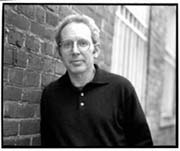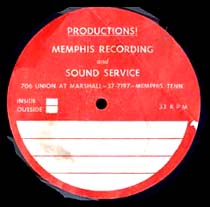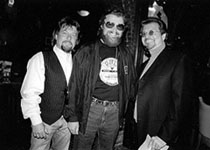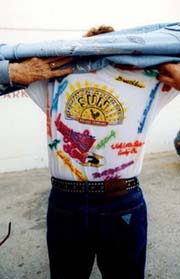 
 Peter Guralnick
Peter Guralnick
Photo by Sandra Wong Geroux
|
Peter Guralnick
Listen to Peter's remarks: 14.4 or
28.8.
Read Peter's further thoughts (not on tape).
Visit our Sam Phillips features on the Memphis Recording Service and WHER.
Other Talk On Features.
Davia and Nikki were there gathering interviews and archival audio for the Lost & Found Sound stories about Sam Phillips and WHER; the first All Girl Radio Station in the World that Sam started in Memphis in 1955. Peter was there working on an A & E Biography of Sam Phillips that will be broadcast Sunday, June 18th, 2000. The three sat down to talk about Sam Phillips, WHER and the place of Memphis in the American Soundscape.
|
Peter has written extensively about American music and musicians. His books include the prize-winning Elvis Presley biography Last Train to Memphis and Careless Love, an acclaimed trilogy on American roots music, Sweet Soul Music, Lost Highway and Feel Like Going Home. |
Individual Audio Excerpts
WHER/ Elvis' Contract: 14.4 or
28.8.
Sound of WHER: 14.4 or
28.8.
Marion Keisker: 14.4 or
28.8.
Could WHER Exist Today?: 14.4 or
28.8.
Sam Philips' Achievements: 14.4 or
28.8.
Memphis Recording Service: 14.4 or
28.8.
Sam Phillips' Recordings: 14.4 or
28.8.
Sam Phillip's Philosophy: 14.4 or
28.8.
HERE ARE SOME FURTHER THOUGHTS OF PETER'S
The Memphis Recording Service.
Sam Phillips.
The Sounds - Loud, Lost & Found.
Peter Guralnick
 | THE MEMPHIS RECORDING SERVICE |
 Memphis Recording Service
Memphis Recording Service
|
"Sam Phillips, by his own proclamation in the newspapers opened up the Memphis Recording Service to give an opportunity for the great Negro artists of the South to record. He wanted to give them an opportunity that they simply had not had up till then. And the rush of talent to his doors indicates how sorely needed the Memphis Recording Service was. To see Rocket 88 with Ike Turner and the Kings of Rhythm, to see Howlin'Wolf, to see all of these great artists just flock to Sam's door shows what a lack there was at that time.
Now, to keep the doors of the Memphis Recording Service open, obviously it was necessary to do anything and everything. As the motto of the Memphis Recording Service proclaimed, "We record anything, any time, anywhere." So Sam would record weddings, he would record bar mitzvahs, he had field equipment to go out and record wherever it was necessary to record. These recordings give a documentation of a particular time. He then leased all of these recordings in the first two or three years of the history of the Memphis Recording Service to labels which put out those recordings, or put out the recordings that they chose to put out on their own label. Recordings to labels like Chess and RPM.
When the Sun label got fully underway in 1953, Sam really had very few records coming out. He basically promoted each record individually. But at that point, he started going on the road quite a bit. To all the Sun distributors who were independent distributors in each town. To Houston and Dallas and to Atlanta. And these were the great independent distributors of those times.
At that time, I can't believe that the Memphis Recording Service continued on a very strong level. I'm sure when Sam was in town he was still prepared to do recordings any time, any place, anywhere, if he wasn't doing recordings of his own. But he started having success with Rufus, with Little Junior Parker, with the Prisonaires. And so obviously as that success pyramided, there wasn't going to be a lot of time for the kinds of things he had been doing because now he was getting into what he really wanted to do. As Sam said, he was scrambling to make a living for his family and he was determined to express himself creatively and he was also determined to survive. And through all these stratagems, Sam worked out what every freelancer has to work out in some way, the ability to make it possible for him to do what he wanted to do."
Peter Guralnick
 | SAM PHILLIPS |
 Sam Phillips and his sons, (L to R) Jerry and Knox. Memphis, 1999.
Sam Phillips and his sons, (L to R) Jerry and Knox. Memphis, 1999.
Photograph by Sandra Wong Geroux.
 Sam's Office at Phillips Recording, Memphis.
Sam's Office at Phillips Recording, Memphis.
|
"Sam Phillips' achievements come in an area that's so foreign -- just as Elvis' achievements come in an area that is expressed in a kind of foreign accent to much of the country. And the fact that it's not academically sanctioned, that it doesn't come in polysyllables, or at least not in the polysyllables of academia, has always created a kind of prejudice, a failure to recognize just what those achievements are.
When I first started writing about blues' singers like Muddy Waters and Johnny Shines and Howlin' Wolf and Robert Pete Williams, different blues singers, Skip James. They were in a sense on the outside. Now, they are on the inside. But the achievements of people like Elvis and Sam and Jerry Lee Lewis are almost more foreign.
It's only in recent years that we've come to prize individuality or regionalism in a sense and not on a universal level at all. But I think there is an appreciation for it that didn't exist at one time. And I think the radio voice, for example, is something that for years was almost universally sought after. And why couldn't Dewey Phillips be Dick Clark, why couldn't he be Alan Freed? Because he was Dewey Phillips. Because he expressed himself in an authentic Dewey Phillips Memphis accent or Adamville, Tennessee, where he was from. The point is that this is the individuality we should seek. This is what Sam Phillips' mission was all about was to bring out the individuality in every person.
It's that inability to listen to each other; it's the quickness to form judgments. It's the way in which we impose moral labels on descriptions of experiences. It's the way in which we're simply not willing to look at life as it's lived, but try to construct theories and boxes to put it in, that I think is most alarming. They're teaching us to value ourselves for all that we are, for all of our imperfections as well as our perfection's and to recognize our individuality and not to shrink from it, not to be afraid of expressing it and not to be afraid of embracing it even when it's most embarrassing."
Peter Guralnick
 | THE SOUNDS, LOUD, LOST & FOUND |
 Sam shows off his Sun Studio T-Shirt. Memphis, 1999.
Sam shows off his Sun Studio T-Shirt. Memphis, 1999.
Photograph by Sandra Wong Geroux. |
"I'm not sure if anything is ever fully lost. I mean, you lose all kinds of things. You lose the sound of a train going by. Although you don't in Memphis. In Memphis you hear the trains all the time. But it's like you graduate from school and you lose all these sounds that were everyday sounds to you. But I think the biggest thing we've lost is the ability to listen, which ties in with the patience to wait for the payoff rather than the immediate gratification.
When you raise the ante it's almost impossible to lower it again. And I think, for example, the volume in music was a liberating thing. When the electric guitar came in, when rock 'n roll came in it, it could be a liberating thing. But the thing is, it becomes increasingly difficult to hear gradations in sound when all that you're used to is amplified sound. I mean, it's very difficult to listen to Robert Johnson immediately after hearing Jimmy Hendrix. It's not to take away from the validity of either one but it's very hard to go back
So I think those are the things you have to consciously strive for, is to allow yourself the time -- to have the patience to wait to hear what's coming. And also to be able to lower your audio expectations to the point that you can hear the power, the incredible power I think sometimes of the music of people like Blind Willie Johnson, of Robert Johnson, -- Tommy Johnson.
You have to be prepared to cast aside the conventions with which you've grown up. You want to hear it's not just Al Jolson. When I started interviewing people, whether it was Jerry Lee Lewis or Jackie Wilson, they started talking about the influence that Al Jolson had on them. I thought they were joking, because all I could think of was "Mammy" and the manner in which he sang. Well you have to accept that that's the manner in which people sang before Bing Crosby. And then you have to listen to it for what it is in that context. And that's the kind of thing, the kind of adjustment that you have to make.
If you're going to want to listen to acoustic music, you have to cast aside your assumptions about amplified music. Now, there are counter-examples to that. World Music has come in to such an extent, I think it's expanded people's listening. And acoustic music has come back in lots of ways. There's no hard and fast rule. So long as we prize individuality, we won't have any problems along those lines. But you've got to leave yourself open. You can't simply set up a certain prescribed universe, whether political or oral, and say well anything that's outside of these boundaries is no good. Because it's the source of the inspiration, as Sam Phillips pointed out to me when I first met him. It's the source that's important. It's not the specific expression."
Other Features:
LNF Andre Millard
LNF Beginnings
LNF Dr. Roosevelt Rubin "Rick" Wright, Jr.
LNF Dr. William Barlow
LNF Jacqueline Hall
Copyright © 2000 The Kitchen Sisters
|

